2014年高考高中英语知识点详解及训练(84):情态动词may、might +完成时
考研语法小知识:情态动词may和might
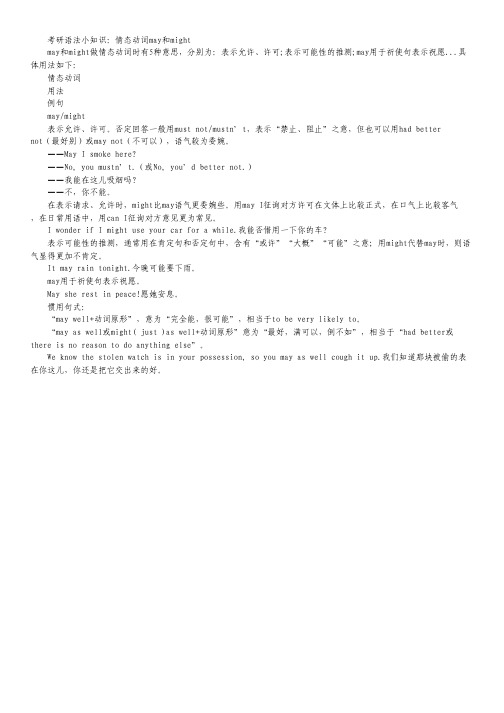
考研语法小知识:情态动词may和might may和might做情态动词时有5种意思,分别为:表示允许、许可;表示可能性的推测;may用于祈使句表示祝愿...具体用法如下: 情态动词 用法 例句 may/might 表示允许、许可。
否定回答一般用must not/mustn’t,表示“禁止、阻止”之意,但也可以用had betternot(最好别)或may not(不可以),语气较为委婉。
——May I smoke here? ——No, you mustn’t.(或No, you’d better not.) ——我能在这儿吸烟吗? ——不,你不能。
在表示请求、允许时,might比may语气更委婉些。
用may I征询对方许可在文体上比较正式,在口气上比较客气,在日常用语中,用can I征询对方意见更为常见。
I wonder if I might use your car for a while.我能否借用一下你的车? 表示可能性的推测,通常用在肯定句和否定句中,含有“或许”“大概”“可能”之意;用might代替may时,则语气显得更加不肯定。
It may rain tonight.今晚可能要下雨。
may用于祈使句表示祝愿。
May she rest in peace!愿她安息。
惯用句式: “may well+动词原形”,意为“完全能,很可能”,相当于to be very likely to。
“may as well或might( just )as well+动词原形”意为“最好,满可以,倒不如”,相当于“had better或there is no reason to do anything else”。
We know the stolen watch is in your possession, so you may as well cough it up.我们知道那块被偷的表在你这儿,你还是把它交出来的好。
高中英语语法情态动词

答案
3.will与would的用法
(1)表示意志、意愿和决心。用于各种人称,will指现在,would指过去。
I will never do that again.我再也不那样做了。
They said that they would help us.
他们说会帮我们。
(2)表示请求、建议。用于第二人称的疑问句中,would表示更委婉的语气。
Will/Would you please take a message for me?
你能帮我捎个口信吗?
考点警示
would与used to
两者均表示“过去常常”,但would仅表示过去的习惯性动作(不表状态),
现在有可能还如此,也可能不再那样;used to既表示过去的动作也表示
过去的状态,不过现在不再做或不再有那种状态了。
高考链接
Ⅰ.用适当的情态动词填空
1.It was really annoying;I couldn’t get access to the data bank you
had recommended.(2016· 天津)
2.You must be Carol.You haven’t changed a bit after all these
B. Can
C. Should D. Would You __________ the meeting to tell me that; you could have come to tell me afterwards. (interrupt)
5.must与can’t的用法
(1) 表 示 “ 必 须 ” , 语 气 比 should , ought to 强 烈 。 其 否 定 形 式 为
高考英语必备知识点:情态动词may与might用法归纳
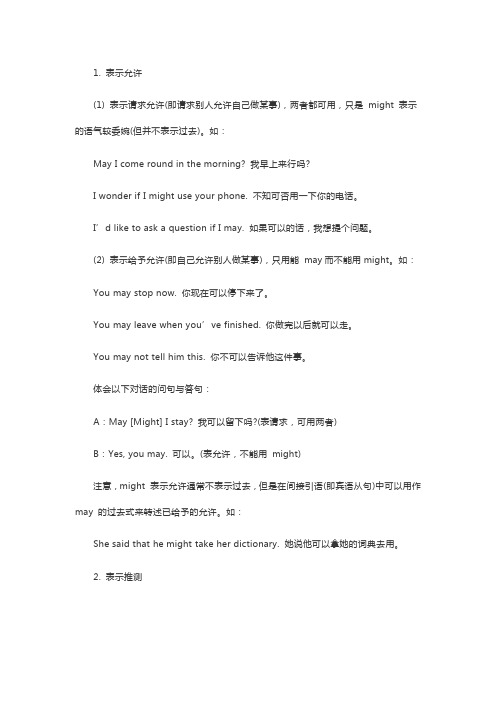
1. 表示允许(1) 表示请求允许(即请求别人允许自己做某事),两者都可用,只是might 表示的语气较委婉(但并不表示过去)。
如:May I come round in the morning? 我早上来行吗?I wonder if I might use your phone. 不知可否用一下你的电话。
I’d like to ask a question if I may. 如果可以的话,我想提个问题。
(2) 表示给予允许(即自己允许别人做某事),只用能may而不能用might。
如:You may stop now. 你现在可以停下来了。
You may leave when you’ve finished. 你做完以后就可以走。
You may not tell him this. 你不可以告诉他这件事。
体会以下对话的问句与答句:A:May [Might] I stay? 我可以留下吗?(表请求,可用两者)B:Yes, you may. 可以。
(表允许,不能用might)注意,might 表示允许通常不表示过去,但是在间接引语(即宾语从句)中可以用作may 的过去式来转述已给予的允许。
如:She said that he might take her dictionary. 她说他可以拿她的词典去用。
2. 表示推测两者都可用,只是might 比may 语气更不确定,表示的可能性更小(注意此时的might并不表过去)。
在句型使用方面:may通常用于肯定句或否定陈述句,一般不用于疑问句(疑问句中用can, 参见can),而might 则可用于肯定句、否定句或疑问句。
在用法方面注意以下几点:(1) 后接动词原形,表示对现在或将来的推测。
如:He may [might] be in his office now. 他现在说不定在办公室里。
Might he know the answer? 他可能知道答案吗?(2) 后接动词进行式,表示动作正在进行或将要发生。
情态动词 may,might 表示“可能”
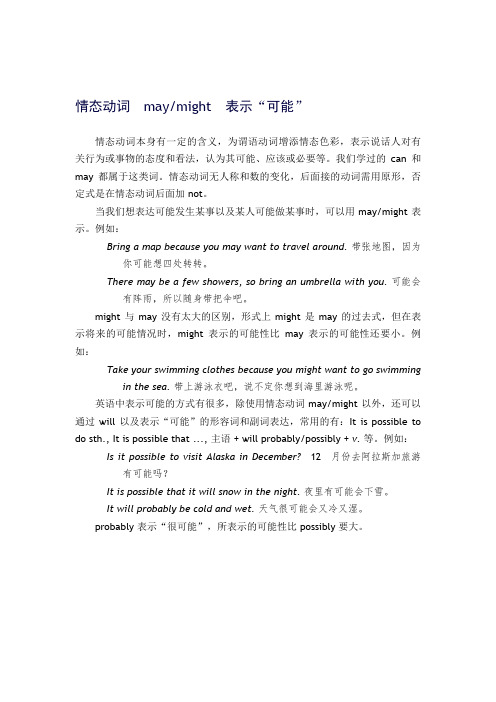
情态动词may/might表示“可能”情态动词本身有一定的含义,为谓语动词增添情态色彩,表示说话人对有关行为或事物的态度和看法,认为其可能、应该或必要等。
我们学过的can 和may 都属于这类词。
情态动词无人称和数的变化,后面接的动词需用原形,否定式是在情态动词后面加 not。
当我们想表达可能发生某事以及某人可能做某事时,可以用 may/might 表示。
例如:Bring a map because you may want to travel around. 带张地图,因为你可能想四处转转。
There may be a few showers, so bring an umbrella with you. 可能会有阵雨,所以随身带把伞吧。
might 与 may 没有太大的区别,形式上 might 是 may 的过去式,但在表示将来的可能情况时,might 表示的可能性比may 表示的可能性还要小。
例如:Take your swimming clothes because you might want to go swimming in the sea. 带上游泳衣吧,说不定你想到海里游泳呢。
英语中表示可能的方式有很多,除使用情态动词 may/might 以外,还可以通过 will 以及表示“可能”的形容词和副词表达,常用的有:It is possible to do sth., It is possible that ..., 主语 + will probably/possibly + v. 等。
例如:Is it possible to visit Alaska in December?12月份去阿拉斯加旅游有可能吗?It is possible that it will snow in the night. 夜里有可能会下雪。
It will probably be cold and wet. 天气很可能会又冷又湿。
情态动词知识点总结高中

情态动词知识点总结高中情态动词是英语中一个重要的语法现象,它们能够表达说话者的情感、态度、意愿等,以及表达说话者对事件的推测、猜测、可能性等。
了解情态动词的用法,能够帮助我们更准确地表达自己的意思,也有助于我们理解他人的意图。
本文将对情态动词的概念、用法、以及常见的情态动词进行总结和归纳,以便于读者更深入地理解情态动词的使用。
一、情态动词的概念情态动词(Modal Verb)是一类特殊的助动词,用来表示说话者的情感、态度、意愿等,以及表达说话者对事件的推测、猜测、可能性等。
情态动词通常用于句子的前面,后面跟动词原形,用来构成不同的语法结构和表达不同的含义。
英语中常见的情态动词有can、could、may、might、must、shall、should、will、would、ought to等。
这些情态动词具有一些共同的特点,比如不能独立完成谓语,后面必须跟动词原形;在疑问句和否定句中,情态动词的位置要发生变化等。
二、情态动词的用法1. 表示能力和可能性can与could表示说话者的能力或者对某种事情的可能性,其中can用于现在时,could用于过去时。
比如:I can speak Spanish.(我会说西班牙语。
)She could swim when she was five.(她五岁的时候就会游泳。
)may与might也表示可能性,may 用于现在时,might 用于过去时。
比如:It may rain tomorrow.(明天可能会下雨。
)I thought she might come.(我以为她可能会来。
)2. 表示请求和建议will与would可以表示请求,will用于肯定句,would用于否定句和疑问句。
比如:Will you please help me?(你能帮帮我吗?)I would like to go with you.(我想和你一起去。
)shall与should也可以表示请求或者建议,should更多地表示建议。
may与might的用法
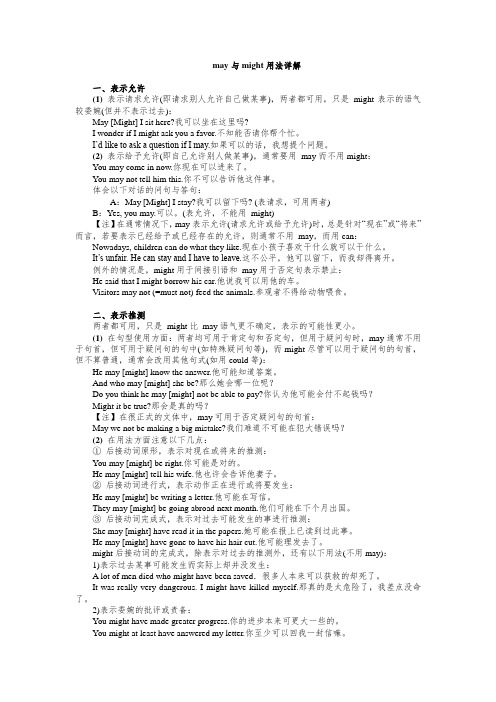
may与might用法详解一、表示允许(1)表示请求允许(即请求别人允许自己做某事),两者都可用,只是might表示的语气较委婉(但并不表示过去):May [Might] I sit here?我可以坐在这里吗?I wonder if I might ask you a favor.不知能否请你帮个忙。
I’d like to ask a question if I may.如果可以的话,我想提个问题。
(2)表示给予允许(即自己允许别人做某事),通常要用may而不用might:You may come in now.你现在可以进来了。
You may not tell him this.你不可以告诉他这件事。
体会以下对话的问句与答句:A:May [Might] I stay?我可以留下吗? (表请求,可用两者)B:Yes, you may.可以。
(表允许,不能用might)【注】在通常情况下,may表示允许(请求允许或给予允许)时,总是针对“现在”或“将来”而言,若要表示已经给予或已经存在的允许,则通常不用may,而用can:Nowadays, children can do what they like.现在小孩子喜欢干什么就可以干什么。
It’s unfair. He can stay and I have to leave.这不公平,他可以留下,而我却得离开。
例外的情况是,might用于间接引语和may用于否定句表示禁止:He said that I might borrow his car.他说我可以用他的车。
Visitors may not (=must not) feed the animals.参观者不得给动物喂食。
二、表示推测两者都可用,只是might比may语气更不确定,表示的可能性更小。
(1)在句型使用方面:两者均可用于肯定句和否定句,但用于疑问句时,may通常不用于句首,但可用于疑问句的句中(如特殊疑问句等),而might尽管可以用于疑问句的句首,但不算普通,通常会改用其他句式(如用could等):He may [might] know the answer.他可能知道答案。
【英语】2014年高考英语语法讲解——情态动词

【英语】2014年高考英语语法讲解——情态动词英语语法在英语学习中比较重要,也是每年高考英语必考点。
今天起,小编将陆续发布如何学习高考英语语法,大家可以跟随日志内容进行学习。
今天教你学“情态动词”!希望高考直通车认证空间(QQ号80796072)为你提供的内容对你备考2014年高考英语作文有所帮助!情态动词概述:情态动词表示说话人的情感态度。
它有一定的实在词义(如:能、会、可能、以前、最好、宁愿),只有谓语特性,必须和其他动词一起构成谓语。
中学阶段常见的情态动词:情态动词: can(could) may(might) must will(would) shall should ought to had better would rather need dare与情态动词相关的短语:be able to have to used to情态动词的固定谓语结构:情态动词+(不带to)动词不定式形式do例如:must + be donemust + be doingmust + have donemust + have been donemust + have been doing注意:ought (to)和used ( to)例外,动词不定式要带上”to”一、情态动词的用法:1.can1)表示能力“能够,会”She can drive, but she can’t ride a bicycle.Can you give me a lift to the station?2)表示对现在动作或状态进行主观的猜测“可能、会”,或表示惊异,怀疑,不相信等态度,主要用在否定句、疑问句或感叹句中。
例如:He can’t have a lot of money.Can it be that it was I, not he, who was mistaken?How can you be so careless!3)表示客观可能性“可能”,可用于肯定句As a human being, anyone can make a mistake.The temperature can fall to -60°C that is 60°C below freezing.4)表示允许“可以”,意思与may 相近,主要用在口语中Can I have a look at your copy of China Daily?This sort of thing can’t go on .5)构成下列特殊句式:①cannot /can never …too … 或cannot …enough越…越好;非常......One cannot be too careful.I cannot thank you enough.You can’t praise him too highly.②cannot help doing …/cannot help but do …/cannot but do …禁不住;不由得;不得不I cannot help admiring the picture whenever I look at it.When a close friend dies, you cannot but feel sad.2. could1)表示能力,指的是过去时间In those days few workers could support their family .I couldn’t follow the teacher in class.2)表示允许,指的是过去时间She asked whether she could take the books out of the reading-room.3)表示可能,可以指过去时间;也可以指现在时间,表示语气缓和I didn't think the story could be true.But you mustn’t smoke while you’re walking around in the bush either. You could start a fire.He looks young .He couldn’t be over fifty .他看起来很年轻,他不可能超过五十岁.4)比较委婉客气地提出问题或陈述看法,指的是现在时间Could I see your license?I have a few friends. I could ring to see if they’re free .Can(could)与be able toCan (could)和be able to表示能力时意思上没有区别.但can 只有现在式和过去式,而be able to 则有更多的形式.No one is able to do it. = No one can do it.Will you be able to come tonight?I’m sorry I haven’t been able to answer your letter.She said she had not been able to come earlier.但是,在表示成功地完成某一具体动作时用be able to 来表示。
(完整版)情态动词must、can、could、may、might精解

would : 1. 表 will 的过去 ,用于过去未来时2.表 "意向 ",愿意做某事3.虚构语气could: 1. 表 can 的过去 ,表过去的能力2表恳求 (委宛语气 )3.表猜想 :可能是 ...4.虚构语气should: 1. 表 shall 的过去 ,用于过去未来时,搭配第一人称2.表委宛的语气 : 应当做 ...3.虚构语气might: 1. may 的过去 ,表猜想 :可能是2.表允许 (委宛语气 )may:1. 表猜想 : 可能是think of shall 和2. 表允许想起 , 想到 ; 没有 think fromwill 的用法的用法一.1、 shall 用在第一、三人称,will用于第二人称表示“征采建议”。
Shall I go now?Shall we invite her, too?Will you help me with the work?Shall the reporters wait outside or what?2、 shall 表示依照规定有义务去做。
Passengers shall not talk with the driver while the bus is moving.3、 shall 用于全部人称,表示说话人的承诺、威迫、警示、命令等。
You shall have an answer by tomorrow.If he’ s good, he shall have a new watch for Christma.If you children don’ t do as I tell you, you shan ’ t go to the party. 4、 would 能够表示过去的习惯(would 可表示频频发生的动作或某种偏向。
used to 表示过去的习惯动作或状态,重申此刻已不存在)He would come to see me on Sunday when he was here.The dog would lie there in the sun all afternoon.When we were children, we would go skating every winter.5、 will 能够表示“愿意” ,而非未来 :I will pay you for it.我会付给你钱买下它的。
高中英语知识点大全(84):情态动词may、might +完成时

高中英语知识点大全(84):情态动词may/might +完成时1、manage vt. 经营;设法;对付She managed the house very well. 她把家管理得很好。
We managed to finish the work ahead of time. 我们设法提前完成了任务。
I shan’t be able to manage without help.没有人帮助,我无法办到。
[辨析] manage to do sth. /try to do sth.manage to do sth.意为“设法完成或做到某事”,强调已达到目的或出现了结果,含“成功”之意。
try to do sth. 意为“试图或尽力做某事”,多表示一种企图或决心,而不表示一定成功。
如:we’ve managed to make up for the lost time.我们设法把失去的时间补了回来。
He tried to pass the examination,but failed. 他努力想通过考试,但没成功。
He managed to organize a live concert. = He succeeded in organizing a live concert.他设法组织了一次现场直播的音乐会。
2、livelive by it 赖……为生;以……为生(不可用于被动语态)Live by(one’s)pen 以笔耕为生live through(it) 活过,度过……而不死(不可用于被动语态) live out 活着,熬过live…life过着……生活 live a hard life过着艰苦的生活 live a miserable life过着悲惨的生活live a happy life 过着愉快的生活 live a quiet life过着安静的生活Einstein lived the rest of his life quietly in the USA. 爱因斯坦在美国安静地度过了他的余生。
超实用高考英语专题复习:情态动词may与might的用法

2、阅读文章要复习。提倡在复习阅读的过程中对三点进行注意:单词、语 法点以及复杂句。平时的阅读复习,在做完题目后要坚持每天读过几篇后,认 真分析1-2篇。
3、把过去老出现错误的归纳一下,看哪类题自己容易错,重点对付该类题 。需要注意的是读文章应力求题材多样化,科普、社会、文化、政治、经济等 ,但如果生词太多,影响理解或过于难懂的文章,则不应花更多的时间。
“倒不如……;还是……为好”
6. May you be happy in the life you’ve chosen.
may置于主语前面表示“祝愿”
翻译句子
1. Too much snow may cause accidents sometimes.
有时,太多的雪会引起事故。(表示可能)
2. —May I open the window to let in some fresh air? —Yes, please.
3. I might not be your little boy anymore,….
表示可能,否定式表示“可能不”
4. You may have won this time, but, Dad...
表示对过去事情的推测,“可能做过……”
5. We might as well give it a shot. Let's go quickly.
rain, might as well
childhood, enjoy
It rained so heavily that I might as well have stayed at home.
情态动词may和might的推测用法-参考模板

情态动词may和might的推测用法一、基本用法说明may和might均可表示推测,两者没有时态上的区别,只是用might比用may语气更不确定,表示的可能性更小。
从句型使用方面看,may和might均可用于肯定句和否定句,但用于疑问句时,may通常不用于句首,但可用于疑问句的句中(如特殊疑问句等),而might尽管可以用于疑问句的句首,但不算普通,通常会改用其他句式(如用could等)。
二、对现在或将来的推测当may和might表示对现在或将来情况作推测时,其后接动词原形。
如:She may [might] know his address. 她可能知道他的地址。
What may [might] be the result of the new tax? 征收新税可能产生什么结果?有时也可后接动词的进行式,表示动作正在进行。
如:She may [might] be waiting for you. 她可能在等你。
He may [might] be writing a letter. 他可能在写信。
正如有时可以用进行时态表示将来意义一样,may / might后接动词的进行式有时也可表示将来意义。
如:We may be buying a new house. 我们可能要买一座新房子。
If I hear from Tim I may be leaving tonight. 如果我从蒂姆那儿得到消息,我可能今晚就离去。
三、对过去的推测表示对已经发生的情况进行推测,用may和might都可以,但其后必须接动词的完成式,即用于“may / might+have+过去分词”这样的形式。
如:She may have missed her train. 她可能误火车了。
Mathews may have written that letter. 这封信可能是麦修斯写的。
“might+动词完成式”除表示对已发生情况的推测外,还有以下用法(此时均不能用ma y):1. 表示未曾实现的可能性:即过去本来可能发生而实际上没有发生的情况,通常译为“本来可以”“本来可能”等。
情态动词must, can, could, may, might表推测的用法

= It is certain that he is ห้องสมุดไป่ตู้merican.
He must be doing his exercises in the classroom (正在进行)他一定在教室里做练习。
She might not come this afternoon. (将来)她今天下午可能不来了。
2. can / could的用法
can 表示推测“可能性”时,往往用于否定句 或疑问句,can’t“一定不”,语气很肯定, can 在疑问句中意思是“会、可能”;could 可用于表示某事有可能发生或可能是事实。 He can’t be at home. 他一定不在家。
= It is impossible that he is at home.
The plane could be delayed by fog. 飞机可能会因为雾晚点。
3. may和might的用法
may, might表示推测“可能性”时,意思是 “可能”、“也许”,可以推测现在正在发 生的动作或过去发生的动作和将来的情况, 语气没有 must肯定。可以用于否定句,意思 是“可能不、也许不”,但不用于疑问句。 might 不表示过去时态,只是语气上比may更 委婉,表示的可能性更小。
maymightmaymight表示推测可能性时意思是可能也许可以推测现在正在发生的动作或过去发生的动作和将来的情况语气没有must肯定
情态动词中的must, can, could, may, might都表推测。其中must的可能性最 大,can / could次之,may / might最小。
情态动词may和might的用法和例句_情态动词 英语语法.doc
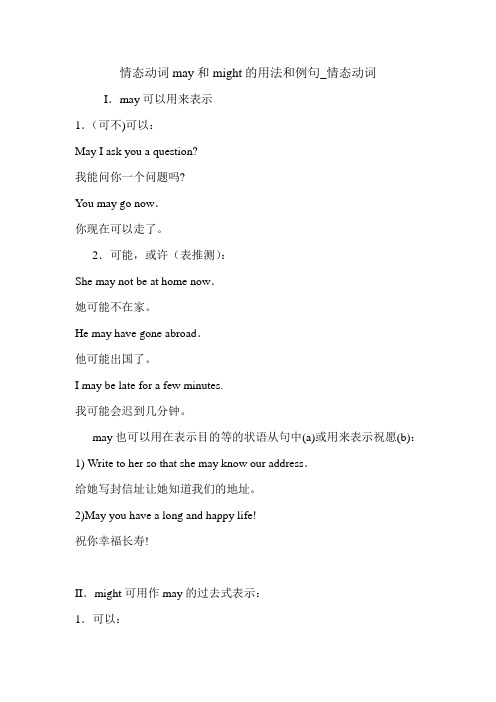
情态动词may和might的用法和例句_情态动词I.may可以用来表示1.(可不)可以:May I ask you a question?我能问你一个问题吗?You may go now.你现在可以走了。
2.可能,或许(表推测):She may not be at home now.她可能不在家。
He may have gone abroad.他可能出国了。
I may be late for a few minutes.我可能会迟到几分钟。
may也可以用在表示目的等的状语从句中(a)或用来表示祝愿(b):1) Write to her so that she may know our address.给她写封信址让她知道我们的地址。
2)May you have a long and happy life!祝你幸福长寿!II.might可用作may的过去式表示:1.可以:He a sked whether he might use our phone.他问可否用我们的电话。
He thought he might have a try.他想他可以试一试。
2.可能,或许:I thought mother might like the idea.我想妈可能会赞成这个想法。
She was afraid he might not agree.她怕他或许不赞成。
might也可用来代替may,使口气显得更委婉或不肯定,表示:1)可以:Might I have a cup of coffee?我可否要一杯咖啡。
You might sit by my side.你可以坐我旁边。
2)可能,或许:The paper says that it might rain.报纸说可能要下雨。
She might have forgotten about it.她或许忘了这件事。
此外还可用在某些从句中(a)或条件句中(b):a.He died so that others might live.他死了使别人能活下来。
高中英语情态动词may和might的用法区别_

高中英语情态动词may和might的用法区别_(1)表示允许、许可,意为可以,在疑问句中用 might 比用may的语气更加委婉,类似于can和could 的用法。
You may come if you wish.如果你想来,你就来。
He was wondering if he might use the computer.他想知道能否用一下电脑。
May/Might I use your pen?我用一下你的钢笔,行吗?一Yes,you may/can是的,你可以。
No,you can t/you d better not./Please don t do it.不,你不可以。
(2)表可能性,用于肯定句和否定句中,might的可能性比may要小一些。
He may know my phone number. 他可能知道我的电话号码。
He might come tomorrow,but I am not他明天可能来,但我拿不准。
She mightn t have heard you when you greeted her 当你和她打招呼时,她可能没听见(表示对过去的推测)(3 ) might have done 可表示过去可能会发生际上并未发生的事情。
That was too dangerous. You might have 那太危险了。
你当时可能会丧命的。
(4) May+主语+动词原形表示祝愿May all your dreams come true.愿你梦May you be happy!祝你幸福!(5 ) may/might as well+动词原形意为还是好,最好。
We may as well stay where we are.我们还是留在现在的地方为好。
(6)may well完全可能,很可能(相当于 be very likely to )You may well get confused.你完全可能会被搞糊涂。
may和might的用法

may和might的用法或解释[may和might的用法]。
在英语中,modal verbs(情态动词)非常常见,它们包括can, could, may, might, must, shall, should, will, would等。
每个情态动词都有自己特定的含义和用法。
本文将重点讨论“may”和“might”的用法。
首先,我们来看一下“may”的用法。
"May"是一个常用的情态动词,用来表示允许、可能、建议、请求或让步等含义。
下面是“may”的主要用法:1. 表示允许:当我们想问或表示允许某事时,可以使用“may”。
- May I sit here?(我可以坐在这吗?)- You may leave early today.(你今天可以早走。
)2. 表示可能性:当我们想表示某种情况是可能发生的时候,可以使用“may”。
- It may rain later.(下雨的可能性很大。
)- He may be late for the meeting.(他可能会迟到会议。
)3. 表示建议:当我们想给出建议或提议时,可以使用“may”。
- You may want to take an umbrella.(你可能需要带把伞。
)- We may consider going on a vacation together.(我们可以考虑一起去度假。
)4. 表示请求:当我们想请求别人做某事时,可以使用“may”。
- May I borrow your pen?(我能借用你的钢笔吗?)- May you please pass the salt?(请你递一下盐。
)下面,我们再来看一下“might”的用法。
"Might"与“may”非常相似,但在一些情况下使用稍有不同。
下面是“might”的主要用法:1. 表示可能性(较低的可能性):与“may”相似,当我们想表示某种情况是可能发生但可能性较低时,可以使用“might”。
英语中情态动词may,might的用法

英语中情态动词may, might的用法情态动词(Modal verbs)本身有一定的词义,表示语气的单词。
但不能独立作谓语,只能和动词原形一起构成谓语。
情态动词用在行为动词前,表示说话人对这一动作或状态的看法或主观设想。
情态动词虽然数量不多,但用途广泛,主要有下列: can (could), may (might), must, need,ought to, dare (dared), shall (should), will (would) must not。
1.may, might的用法may, might都表示“可以”,不过might更客气委婉一些:May I join you?我可以加入你们吗?They may use ours.他们可以用我们的。
You might as well tell the truth.你不妨讲真话。
may和might都表示“可能”、“或许”:He may have known it already.他可能已知道了。
That may happen sometimes, you know.你知道,那种事有时可能发生。
You might have caught a cold.你也许感冒了。
Anybody might make mistakes.任何人都可能犯错误。
may, might用在表示目的等一些状语从句中:Tell her your phone number so that she maycontact you in future.把你的电话号码给她,以便她今后与你联系。
She studies very hard so that she might apply to a bettercollege.她学习很用功,以便能报考一所较好的大学。
本文作者:丹丹英语(公众号:英语语法学习)英语中情态动词may, might的用法情态动词(Modal verbs)本身有一定的词义,表示语气的单词。
情态动词 第四讲 情态动词may might用法

may/might用法(四)
【归纳】
【典题】(2010· 江苏六合高级中学 ) — We ________ as well go straight home. There’s nothing better to do. — OK, though I hate to do so. A. might B. can C. should D. must
3. What a pity!Considering his ability and experience, he____better.
(2009· 安徽)
4. Some people who don’t like to talk much are not necessarily shy;
they_____ just be quiet people.
【典题】
(2010· 四川) 1. —______ I take the book out?
—I’m afraid not.
A. Will B. May C. Must D. Need
may/might用法(二)
【归纳】
【典题】
(2013· 北京)
1. — You needn’t take an umbrella. It Leabharlann sn’t going to rain.
三、能力突破
(2002· 春) 1. — I hear you’ve got a set of valuable Australian coins. __I have a look? — Yes, certainly. A. Do B. May C. Will D. Should
(2008· 江西)
— Well, I don’t know. It _____ do. A. might B. need C. would D. should
考研英语:语法(情态动词-may,might)

考研英语:语法(情态动词-may,might)•相关推荐考研英语:语法大全(情态动词-may,might)情态动词——may, mightmay和mightmay表示“允许”或“请求”May I come in? -Yes,do.我可以进来吗?——请进。
May I borrow you raincoat?我可以借用你的雨衣吗?You may go now.你现在可以走了。
You may ring us up any time during office hours.在办公时间你可以随时给我们打电话。
注:may表示“允许”的否定形式是must not(不应该,不许可)。
如:May I take this book out of the reading-room?-No,you mustn't.我可以把这本书拿出阅览室吗?——不行。
may还可表示说话人的猜测,认为某一事情“或许”或“可能”发生We may call on you this evening.我们也许今天晚上来看你。
She may not go to the concert tonight.今晚她可能不去听音乐会了。
The news may or may not be true.消息也许是真的,也许不是真的'。
注:may用在感叹句中可表示祝愿,愿望如:May you succeed.祝你成功。
May you have a pleasant journey.一路平安。
might为may的过去式The speaker said we might ask him any question.作报告的人说我们可以向他提任何问题。
He said he might go to the Palace Museum on Sunday.他说他星期天可能去参观故宫博物院。
注一:night也可代替may,表示现在,但语气较为婉转客气或更加不肯定。
- 1、下载文档前请自行甄别文档内容的完整性,平台不提供额外的编辑、内容补充、找答案等附加服务。
- 2、"仅部分预览"的文档,不可在线预览部分如存在完整性等问题,可反馈申请退款(可完整预览的文档不适用该条件!)。
- 3、如文档侵犯您的权益,请联系客服反馈,我们会尽快为您处理(人工客服工作时间:9:00-18:30)。
高中英语知识点大全(84):情态动词may/might +完成时1、manage vt. 经营;设法;对付
She managed the house very well. 她把家管理得很好。
We managed to finish the work ahead of time. 我们设法提前完成了任务。
I shan’t be able to manage without help.没有人帮助,我无法办到。
[辨析] manage to do sth. /try to do sth.
manage to do sth.意为“设法完成或做到某事”,强调已达到目的或出现了结果,含“成功”之意。
try to do sth. 意为“试图或尽力做某事”,多表示一种企图或决心,而不表示一定成功。
如:
we’ve managed to make up for the lost time.我们设法把失去的时间补了回来。
He tried to pass the examination,but failed. 他努力想通过考试,但没成功。
He managed to organize a live concert. = He succeeded in organizing a live concert.
他设法组织了一次现场直播的音乐会。
2、live
live by it 赖……为生;以……为生(不可用于被动语态)Live by(one’s)pen 以笔耕为生
live through(it) 活过,度过……而不死(不可用于被动语态) live out 活着,熬过
live…life过着……生活 live a hard life过着艰苦的生活 live a miserable life过着悲惨的生活
live a happy life 过着愉快的生活 live a quiet life过着安静的生活
Einstein lived the rest of his life quietly in the USA. 爱因斯坦在美国安静地度过了他的余生。
The working people are living a happy life now. 劳动人民过着幸福的生活。
3、“情态动词may/might +完成时”的结构的用法:
①may/might + have + 过去分词,表示推测过去某动作“可能”发生了。
如:
I can’t find my sunglasses, I may/might have left them at the restaurant yesterday.
一般来说,may和might两者意思上没什么区别,只是may比might表示的可能性大些。
如:
He may have heard of it from Jack.
He might have heard of it from Jack.
在下列情况下,may和might 用法有区别:
句子的主要动词是现在时,间接引语中用may/might;
句子的主要动词是过去时,间接引语中只用might.如:
He says that she may/might have misunderstood him.
He said that she might have misunderstood him.
②might + have + 过去分词,表示对本来可能发生而实际并未发生的动作的感叹或遗憾含有“责备”、“抱怨”之意,而may+完成时无此含义。
如:
You might have told us earlier.
This medicine might have cured your cough.。
